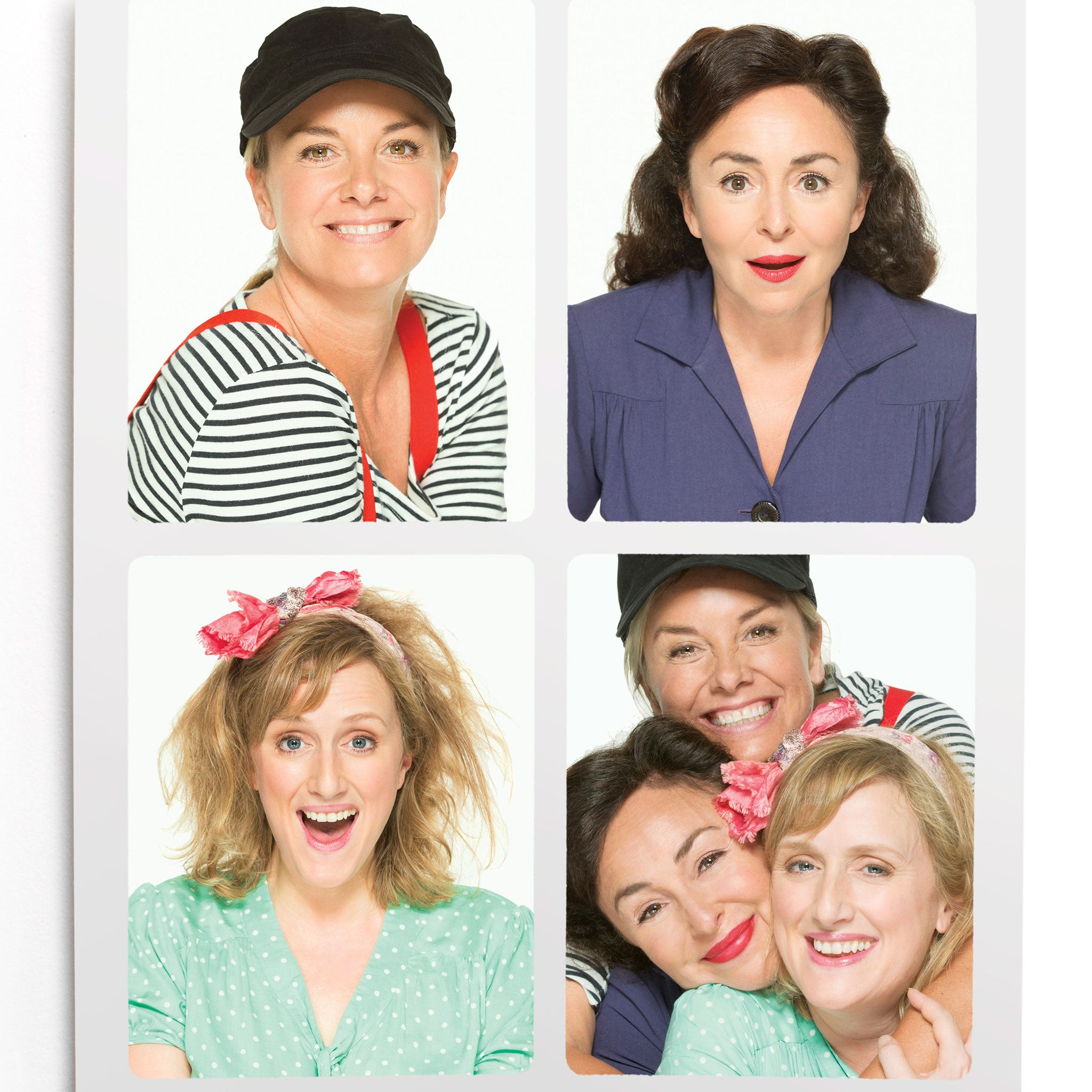Amelia Bullmore: How I wrote my latest play with a little help from my friends
As "Di and Viv and Rose" transfers to the West End, the actress and writer reveals the unusual inspiration behind her hit tale of three female confidants

Your support helps us to tell the story
From reproductive rights to climate change to Big Tech, The Independent is on the ground when the story is developing. Whether it's investigating the financials of Elon Musk's pro-Trump PAC or producing our latest documentary, 'The A Word', which shines a light on the American women fighting for reproductive rights, we know how important it is to parse out the facts from the messaging.
At such a critical moment in US history, we need reporters on the ground. Your donation allows us to keep sending journalists to speak to both sides of the story.
The Independent is trusted by Americans across the entire political spectrum. And unlike many other quality news outlets, we choose not to lock Americans out of our reporting and analysis with paywalls. We believe quality journalism should be available to everyone, paid for by those who can afford it.
Your support makes all the difference.I decided to write Di and Viv and Rose in 2009 when I saw a woman’s calves that were just like the calves of a friend, Anne, who I hadn’t seen for months. The lurch of longing to see her (prompted by the calves) was so strong that, later, I thought: I’d like to try and catch that in a play.
I was acting in a production of Alan Ayckbourn’s The Norman Conquests that transferred from London to Broadway. I’d agonised about going (could I possibly abandon ship for four months?) and made a hash of deciding – telling my family that I definitely wouldn’t go and then realising I definitely had to. I made a calendar showing when they could visit me, in half terms and holidays, and when I’d visit home (all the actors in the production had young children so the performances were cannily scheduled to allow us two mini-trips back). It was an unforgettably good adventure.
The calves I saw that were like Anne’s were in New York. They didn’t even belong to a stranger. Their owner was a woman I was working with and had arranged to meet. Regardless of this, my brain dream-ishly converted her into Anne and my chest duly lurched. I’d been braced for missing my family while I was away but hadn’t bargained on just how powerfully I’d miss friends.

I began to think about trying to catch the ardour of female friendship and also to wonder how I might catch the quality of enduring friendship. Thirty-odd years in two hours. When the thing you want to say is so obvious – Friendship is a Good Idea – you’d better say it entertainingly. The good news is, entertainment sits naturally in every friendship worth its salt.
I went to visit a friend in Liverpool not long ago. She said she’d meet me off the train at Lime Street station but I couldn’t see her in the crowd on the concourse. I skated my eyes past a couple locked in a passionate embrace – give the lovers some privacy – but then stole another look and realised it was my friend hungrily kissing a life-sized statue of Ken Dodd. For a joke. For my delight. I laughed my head off. I laugh now when I think about it. Sometimes, on my way to see a friend, I’m close to laughing in anticipation of the laughing I know we’re going to do. (Before I go on I want to say that I sometimes recognise the person I’ve arranged to meet more or less instantly. I should also say that my eyesight’s not great).
Delight isn’t the only thing friends exchange, of course: anguish, doubts, bulletins and beefs are traded too. There are some gloriously talkative men about but my hunch is that women are more likely to have grown up being told stories, often by women, about other peoples’ lives – neighbours, relatives, friends of friends – and are more likely to thrive on the continued collecting and sharing of these stories. Given that we’re all cruising or hurtling towards our doom (and we don’t know which) it’s a source of comfort and diversion to be tuned into hundreds of other peoples’ trips, past and present. Small stories, but in aggregate, a vast database of how life can be lived. I know stories about my friends’ cousins. People I’ll never meet. I find that entirely worthwhile.
The recruiting of a friend – that period of enchantment and first exchanging of stories – needed to be in the play I wanted to write, I decided. As did the particular potency of friendships made when you first leave home: “second family” friendships. It’s the first time you rely on people you’ve chosen, rather than people you’ve been dealt and who’ve been dealt you. These intense young friendships are ones in which almost every kind of loving impulse can be played out – worship, protection, guidance and encouragement as well as the darker impulses to quash and control.
Although the play begins with the characters, aged eighteen, at university, sharing a house, I didn’t want the actresses playing them to be eighteen. The actresses are the age their characters are at the end of their story. They report back from middle age to be their young selves. I’ve been asked if I’d like to adapt Di and Viv and Rose for television or to write it as a film but in my mind it’s a play, and a play only, because of this conceit. Not just because in a theatre an audience is likelier to make the leap of belief – that these women are girls – but also because my experience of growing older is that you are the same but different. You are the girl and the woman. You don’t so much shed as keep on adding. If you age at roughly the same rate as your friends, you don’t only feel largely the same, but also (almost) appear to each other as largely the same. The other reason why it’s a play and a play only for me is that what the audience witnesses, live – the feat of joint endeavour – is what it’s about.
Since its original run at the Hampstead Theatre, Di and Viv and Rose has been picked up by A-level drama students – real 18-year-olds – who have to think themselves older as the play unfolds. There’s no time for wigs or latex. Everyone’s too busy running around backstage fetching bicycles and tearing costumes on and off.
I couldn’t have written this play without my friends. I don’t mean that I consulted them. I mean that they run through it. Things they’ve said. Things they’ve shown and taught me. No particular real friend is portrayed in the play. Even if I’d wanted to plug in a real person (which I emphatically didn’t), real people are no use. You have to fashion characters who’ll give you the specific kinks and tussles you need in order to write the story that says what you want to say. It’s the same with real events, although a crumb of partial knowledge (one of those stories heard, maybe) can be what you choose to invent around, according to your design. I don’t mean don’t research facts, by the way. Definitely research facts.
The continuum of mutual, intimate knowledge is a valuable thing. When you ask after an old friend’s mum or dad – a mum or a dad who, long ago, made you up a bed on the family sofa or chatted with you or ran you to the station – that’s an informed enquiry. It has weight for both the asker and the asked because it has context. In mid-life, this continuum’s especially consoling because, glancing either forwards or back, you’re likely to notice people you love heading towards departures of one kind or another. And if you were ever in any doubt about the commonplace brutality of luck and lack of it, enduring friendship lays that bare, too. I’ve got a friend I used to be put in a cot with, 50 years ago. I’ve got friends who didn’t make it to 50. I’ve got friends who go from strength to strength. I’ve got friends who are terribly ill. That’s life. All I’m saying is, don’t attempt it alone.
‘Di and Viv and Rose’ is at the Vaudeville Theatre from 22 Jan to 23 May 2015 www.diandvivandrose.com
Join our commenting forum
Join thought-provoking conversations, follow other Independent readers and see their replies
Comments